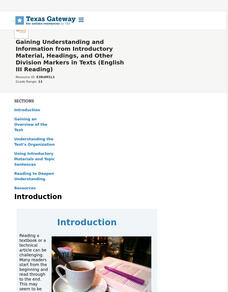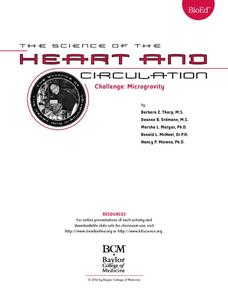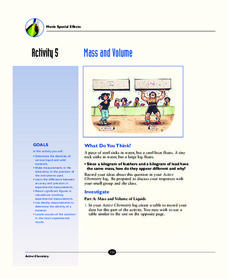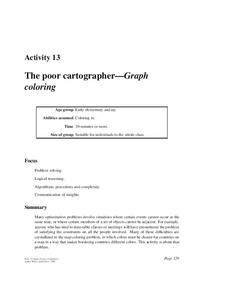CPO Science
The Periodic Table
Here is a six-page exploration that will spark interest in the periodic table of elements. After reading a diagram-supported explanation of the periodic table's organization, pupils answer questions to familiarize themselves with it. To...
G. Turrell
Science Activity 1: Light & Sound
Are you looking for lab sheets to go with your class experiment on plant response to light? You are no longer in the dark! This is a lesson that was written for a unit on light, but could easily be used to demonstrate plant behaviors in...
National Science Teachers Association
Metals Metalloids Nonmetals
When physical science classes are becoming familiar with the periodic table of elements, you can use this set of printable cards to help them memorize some of the members of the metals, metalloids, and nonmetals groups. There are 24...
National Park Service
Hibernation-Migration-Fascination
What's the difference between hibernation and a good nap? Find out with an engaging life science activity that compares the hibernation habits of grizzly bears and marmots. After learners read an informational passage about each mammal,...
Texas Education Agency (TEA)
Gaining Understanding and Information from Introductory Material, Headings, and Other Division Markers in Texts (English III Reading)
All teachers are teachers of reading! The 13-part interactive series ends with a lesson that teaches learners (and their instructors) how to approach reading their textbooks. After learning about several strategies, users test their...
Curated OER
Plate Tectonics
Help young scientists piece together the theory of plate tectonics with this comprehensive collection of materials. Whether your are looking for worksheets, hands-on activities, or assessments, this resource has everything...
Ask a Biologist
It’s a Plankton Eat Plankton World
For as small as they are, plankton sure play an enormous role in maintaining marine ecosystems. Dive into an investigation of these tiny organisms with a hands-on life science activity in which children cut out pictures of sea...
Baylor College
Challenge: Microgravity
What a festive way to examine what happens to the heart in different gravitational situations! Small groups place a water-filled balloon in different locations (on a table top, in a tub of water, and held in a vertical position), drawing...
It's About Time
Mass and Volume
Don't be so dense that light bends around you; study the relationship between mass and volume instead. Young chemists measure the density of a variety of liquids and solids. A reading passage and analysis questions introduce pupils to...
Texas State Energy Conservation Office
Investigation: Kinetic and Potential Energy
A well-developed lab sheet guides physical science learners through an investigation of kinetic and potential energy. In small groups, collaborators discover whether or not the ramp height or mass of an object has an effect on the...
Institute of Electrical and Electronics Engineers
Playing with Parachutes
This lesson certainly will not be a drag! Little engineers design parachutes that make use of air resistance and, as a result, slow the descent of the payload as much as possible. It is an opportunity to teach about many motion concepts:...
Curated OER
Human Body Series - Cardiovascular System
Pump up your class while studying the cardiovascular system with this pair of activities. In one, learners record heart rates during different actions. In the second, they read kid-friendly heart health articles online and then write a...
University of Pennsylvania
Evolution by Natural Selection
A diagram, data table, and reading passage top this resource. Through it, biology beginners are introduced to the concept of natural selection. They answer some questions and then participate in a simulation using fabric as a habitat and...
It's About Time
Sounds in Strings
How many of your pupils play an instrument? A musical science lesson will help all of them understand how string instruments work. Young scientists construct a string-and-pulley system to test frequency and pitch. The lesson...
It's About Time
Identifying Matter
High schoolers test wood splints that have been soaked in mystery solutions to identify the different colors it produces when lit. The lesson concludes with a reading passage and analysis questions.
The New York Times
Trouble in the Hive: Researching the Decimation of Honeybee Colonies
Teach your class about colony collapse disorder and foster discussion about causes and solutions for the honeybee problem. Class members read and discuss an article and participate in one of two detailed activities about pollination and...
Illustrative Mathematics
US Garbage, Version 1
An interesting example of a discrete function and how it is applies to the real world. This could easily make a good collaborative instructional activity with an environmental science class. Practice reading a table and drawing a scatter...
It's About Time
Volcanic Hazards: Airborne Debris
Pupils interpret maps and graph data related to volcanic ash. Then they analyze the importance of wind speed and the dangers of the ash to both life, air temperature, and technology.
American Museum of Natural History
Differentiate! The Stem Cell Card Game
Let the games grow. Groups play a card game to grow cells. Players start growing cells from stem cells to create specialized cells in the human body. Learners use full-grown cells from the human body to create stem cells in the lab to...
Computer Science Unplugged
The Poor Cartographer—Graph Coloring
Color the town red. Demonstrate the concept of graph theory with a task that involves determining the least number of colors needed to color a map so that neighboring countries are not represented by the same color. Pupils...
Curated OER
A Research Project and Article For the Natural Inquirer
Get your class to use the scientific process to solve a scientific problem. They utilize the Natural Inquirer magazine to identify a research question which they write an introduction to and collect data to answer. They use graphs,...
Weebly
Phases of Life Poster Project
Now this is a clever approach to familiarizing aspiring astronomers with the phases of the moon! They first record the specific dates for ten special events in their lives. Then they use an online moon phase calendar to find out which...
National Park Service
The Secret of Life
Dead trees provide nutrients for the soil, food for animals, protection and a home for organisms, a seed-bed for new trees, and a place for nitrogen-fixing bacteria to live. In the activity, pupils collect decaying logs, expose them to a...
Lake Afton Public Observatory
Shadows, Angles, and the Seasons
Shine some light on the topic of seasonal change with this collection of activities. Whether it's by measuring the change in the length of their shadows, or modeling the earth's orbit around the sun using a lamp and a globe, these...























